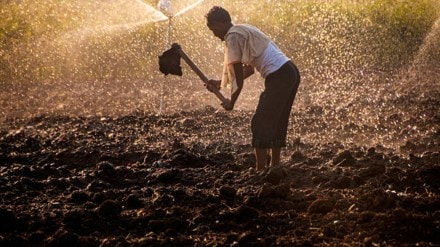The Union Minister of Consumer Affairs, Food and Public Distribution and New & Renewable Energy, Pralhad Joshi, launched the Credit Guarantee Scheme for e-NWR-Based Pledge Financing (CGS-NPF) in December 2024. This landmark initiative aims to provide farmers with easier access to post-harvest credit, backed by a Rs 1,000-crore corpus, through electronic negotiable warehouse receipts (e-NWRs) and this credit guarantee amount is increasing every year.
The scheme will allow farmers to avail loans after depositing their commodities in Warehousing Development and Regulatory Authority (WDRA)-accredited warehouses. The initiative is designed to instill confidence among bankers, encouraging the extension of pledge finance to farmers and traders who store their agricultural and horticultural produce in these registered facilities, according to the Press Information Bureau,
Farmers can now easily access credit using electronic warehouse receipts, with the National E-Repository Ltd (NeRL) leading the charge in digitising warehouse receipts and integrating technology-driven governance into pledge finance.
The importance of e-NWRs in agricultural financing was further underscored at a high-powered conference held on February 8 in Delhi. The event saw participation from key industry figures, including WDRA Chairperson Anita Praveen, NABARD Deputy Managing Director Dr. Ajay Kumar Sood, NCDEX Managing Director Atul Raste and NeRL Managing Director Saurabh Khanna. The discussions centered around the transformative impact of e-NWRs in pledge finance, with two pivotal sessions titled:
Policy to Practice: e-NWR in Pledge Financing
Creating Impactful Financing Solutions with e-NWR
Special addresses were delivered by Durgesh Pandey, CEO of NCGTC and Soma Sankara Prasad, former Chairman of UCO Bank. Both speakers highlighted the role of innovative credit guarantees and financing models in bolstering agricultural credit access.
Traditionally, warehouse receipts were paper-based, making them susceptible to forgery, damage, and cumbersome handling. In contrast, NeRL’s e-Warehouse Receipts (eWRs) provide a secure digital alternative, mitigating these risks and streamlining transactions. The introduction of eWRs is poised to have an impact similar to the role played by CDSL and NSDL in the securities market, significantly enhancing the financialization of commodity storage.
This digital transformation benefits multiple stakeholders—farmers gain easier access to credit, traders can conduct transactions more efficiently, and banks have greater confidence in lending against these digital assets. Beyond warehousing digitisation, NeRL is set to revolutionize sustainable and innovative financing, reinforcing the agricultural economy’s resilience and financial inclusivity.
Last year, the government introduced e-Upaja Kisaan Nidhu, an online digital gateway designed to enable farmers to store their agricultural produce with the Warehousing Development and Regulatory Authority (WDRA) and secure post-harvest loans from banks.
According to Food Secretary Sanjeev Chopra, the credit guarantee scheme is expected to significantly expand post-harvest lending, increasing it from Rs 3,962 crore in FY24 to Rs 5.5 lakh crore over the next decade.
